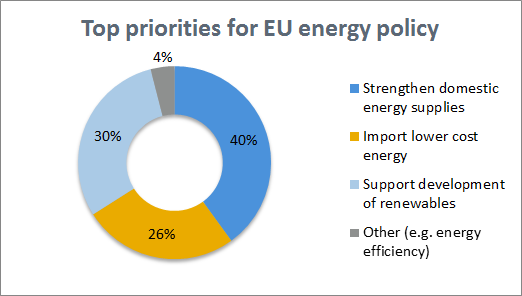Last month, Andrew Wright, interim chief executive of Ofgem, the UK’s government regulator for the electricity and natural gas markets, warned that “Britain’s energy industry is facing an unprecedented challenge to secure supplies” and that as a result, the country now faces a growing risk of power shortages by 2015.
This fear of a critical energy shortage (and its consequences) is trending throughout Europe, leaving Brussels and national governments pursuing policies to secure energy supplies through all available avenues: Britain is looking to “explore and unlock” domestic shale gas potential, Spain (pre-July 2013) strongly supported alternative energy sources such as solar and wind, and Germany’s Energiewende aims to deliver a nuclear-free energy mix. The diversity of these policy choices and others, however, does not inspire confidence amongst Europe’s energy-intensive industries, which see the lack of a comprehensive and enforced EU energy policy as one of the reasons for Europe’s looming energy scarcity.
According to a recent survey conducted by FleishmanHillard, the majority of senior, European, business leaders believe that Europe is likely to face a critical energy shortage within the next five years (74%). Respondents predominantly place the blame at the feet of domestic energy policies in Europe: the shift away from nuclear power, the lack of a comprehensive and enforced domestic EU energy policy, underinvestment in critical energy infrastructure – the list continues. Some consider Europe’s failure to adequately develop foreign sources of energy a significant contributor. Interestingly, results show that this fear of energy scarcity is driving industry positions on Europe’s future energy mix, and that the fear of supply not meeting demand is a causal factor in rising support for increased domestic energy development.
Taking into account political, environmental and/or financial costs, 40% of respondents highlighted that increased domestic resources should be the priority for EU energy policy – this number increases to 70% when including renewables (solar, wind, biofuels, etc.) as domestic energy sources. Increasing foreign energy sources? This came in third at 26%. However, when asked about solutions with the most immediate impact on Europe’s energy problems, traditional imports polled in a very strong second place (44%), ahead of renewable energy (38%) but behind domestic energy sources (70%). The results suggest that while leaders of energy-intensive industries champion new energy sources and are ready to contribute to the transition to a low-carbon economy, they are acutely aware that in the more immediate term increasing foreign energy imports may be a more effective means of ensuring a consistent energy supply.
Europe is under pressure to respond to the “unprecedented” challenges to its energy mix, and key will be ensuring confidence in the stability and competitiveness of the European market. The role of industry in meeting these challenges is undeniable, and thus it will be important for Europe to consult whether it supplies what Europe demands. Following the results of our survey, the pursuit of domestic energy sources, conventional, unconventional and renewable, and completion of the Internal Energy Market would be steps into the right direction.
1
Find Out More
-
Generative AI is changing the search game
May 8, 2025
-
The challenges facing Europe and European leaders at Davos 2025
January 24, 2025




July 22, 2013 | 2:52 PM
[...] Does Europe supply what Europe demands? [...]